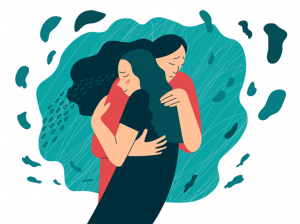Live Streaming
To view a Live Stream please select chapel where service is being conducted.
Please be assured that this is our only website and the only place we would advertise livestreams apart from our official Facebook page. Please be aware of scams and do not enter any credit card details under the pretence of accessing the streaming service.
The links provide viewing of services live. To view previous services please use our Online Tributes page.
**Whilst every effort will be made to ensure the live streaming and website are working, Millingtons takes no responsibility for, and cannot be held liable for, the unavailability of live streaming, in part or full, due to technical issues beyond our control.**Live Streaming
To view a Live Stream please select chapel where service is being conducted.
To view previous services, please
click on the above dragon fly icon.
Grief is a natural response to losing a loved one.
It is normal to grieve when you lose someone close and this grief can present in emotional and physical ways. You might feel numbness, disbelief, a racing heartbeat, anger, sadness, despair and guilt.
The experience of grief is different for every individual, and so too is the length of time associated with grief. For some, grief might last months, for others, years can pass by. The sense of loss may never fully leave you, but grief often does ease with time.
The complex emotions felt are a direct result of having loved. Here at Millingtons, we understand this. At first you may feel disbelief at a loved one’s death and want to deny that it’s occurred. As the reality sinks in, other emotions can surface such as anger. Often this can be misdirected at family members or difficult to manage, but if you or someone is feeling angry it’s important to acknowledge this by talking and listening.
Give yourself time to experience grief and understand that those around you will feel it differently. There are no rules as to how one moves through it, but know that Millingtons are here for you and we understand the complexities of grieving.
Understanding Grief
Grief is the price we pay for love and how we respond when we experience loss. Grief is a normal, natural and inevitable response to loss and it can affect all parts of our lives. Grief allows us to gradually adjust to our loss and find a way of going on with our life. Everyone experiences grief in their own way, there is no ‘correct’ way to grieve, and no way to ‘fix it’. Grief can seem like a roller-coaster ride with ups and downs, or it may feel like we are a boat caught in a storm. This can be overwhelming and frightening. Grief allows us to gradually adjust to our loss and find ways of going on with our life without the person who has died.
Feelings
We may experience intense feelings such as shock, chaos, sadness, anger, anxiety, guilt, disbelief, panic, relief, or even numbness. Some people are fearful as they are adjusting to a loss that they may forget or lose the connection with the person who has died.
Thoughts
We may feel confused and find it difficult to concentrate. It is not unusual for people to have ‘extraordinary experiences’ such as dreams of the person who has died or to have a sense of them being around still. These can be comforting and help us feel close to the person who has died. We may think we will never get over the death of our loved one, or that we are going crazy. We may think that it’s too hard and wish we were with that person. This is an expression of our pain and sadness.
Physical reactions
Sometimes we may have trouble sleeping. Grief can also have physical symptoms such as tiredness, lack of appetite, nausea or pain. If these symptoms persist, please seek medical advice from your GP.
Relationships
Sometimes we will be preoccupied or tense or feel disinterested in other people and social activities.
Behaviours
We may experience lack of energy or overactivity, pay little attention to self-care, sleep a lot, resort to alcohol or non-prescribed drugs and other potentially harmful
behaviours.
Beliefs
We may question our beliefs about life. Often wondering why this has happened to them.

Stages of Grief
Denial
It’s not unusual to respond to the strong and often sudden feelings by pretending the loss or change isn’t happening. Denying it gives you time to more slowly absorb the news and begin to process it. This is a common defence mechanism and helps numb the intensity of the situation. As you move out of the denial stage, however, the emotions you haven’t been dealing with will begin to rise. You’ll be confronted with a lot of sorrow. That is also part of the journey of grief, but it can be difficult.
Anger
Anger is a masking effect. Anger is hiding many of the emotions and pain that you carry. This anger may be redirected at other people, such as the person who died, your ex, or your old boss. You may even aim your anger at inanimate objects. While your rational brain knows the object of your anger isn’t to blame, your feelings in that moment are too intense to act according to that. Anger may mask itself in feelings like bitterness or resentment. It may not be clear-cut fury or rage. Not everyone will experience this stage of grief. Others may linger here. As the anger subsides, however, you may begin to think more rationally about what’s happening and feel the emotions you’ve been pushing aside.
Bargaining
During grief, you may feel vulnerable and helpless. In those moments of intense emotions, it’s not uncommon to look for ways to regain control or to want to feel like you can affect the outcome of an event. In the bargaining stage of grief, you may find yourself creating a lot of “what if” and “if only” statements. It’s also not uncommon for religious individuals to try to make a deal or promise to God or a higher power in return for healing or relief from the grief and pain. Bargaining is a line of defence against the emotions of grief. It helps you postpone the sadness, confusion, or hurt.
Depression
Depression may feel like a quiet stage of grief. In the early stages of loss, you may be running from the emotions, trying to stay a step ahead of them. By this point, however, you may be able to embrace and work through them in a more healthful manner. You may also choose to isolate yourself from others in order to fully cope with the loss. That doesn’t mean, however, that depression is easy. Like the other stages of grief, depression can be difficult and messy. It can feel overwhelming. You may feel foggy, heavy, and confused. Depression may feel like the inevitable landing point of any loss. However, if you feel stuck here or can’t seem to move past this stage of grief, you can talk with a mental health expert. A therapist can help you work through this period of coping.
Acceptance
Acceptance is not necessarily a happy or uplifting stage of grief. It doesn’t mean you’ve moved past the grief or loss. It does, however, mean that you’ve accepted it and have come to understand what it means in your life now. You may feel very different in this stage. That’s entirely expected. You’ve had a major change in your life, and that upends the way you feel about many things. Look to acceptance as a way to see that there may be more good days than bad.
There may still be bad — and that’s OK.
 How long will it take?
How long will it take?
Grief has no timeline. It is not unusual for grief to be felt over an extended period of time, even for many years. At first, the grief feels stronger and as time passes, we learn to manage the grief. Sometimes, after a period of feeling good, we find ourselves experiencing sadness, despair or anger. This is often the nature of grief, ups and downs, and it may happen over and over. Life will eventually have meaning again, although our loss will always stay with us.
How do we grieve?
Everyone grieves differently, there is no right or wrong way. The pain of our grief needs to be expressed, whether it’s sharing our feelings with others or in private. We do not always know how people are grieving simply by what we see. Some people want to express their grief through crying and talking. Others may be reluctant to talk and prefer to keep busy. Family members can all grieve differently. People may behave differently at various times and it is important to respect each other’s way of grieving.
I didn’t go through the stages?
Avoiding, ignoring, or denying yourself the ability to express your grief may help you dissociate from the pain of the loss you’re going through. But holding it in won’t make it disappear. And you can’t avoid grief forever. Over time, unresolved grief can turn into physical or emotional manifestations that affect your health. In order to heal from a loss and move on, you have to address it. If you’re having trouble processing grief, consider seeking out counselling to help you through it.
Why is understanding the stages important?
Grief is a natural emotion to experience when going through a loss. While everyone experiences grief differently, identifying the various stages of grief can help you anticipate and comprehend some of the reactions you may experience throughout the grieving process. It can also help you understand your needs when grieving and find ways to have them met. Understanding the grieving process can ultimately help you work toward acceptance and healing.
Helping yourself
Grief is like a journey to an unknown destination that you cannot control or plan. It is important to know that expressing grief or seeking support are not signs of weakness, but a way through to a healthy adjustment. Here are some suggestions for getting through the difficult times. Remembering, that you will grieve in your own way. Privately and personally, you may sometimes prefer to keep your thoughts and
feelings to yourself:
- Try not to rush into big decisions too soon.
- Memorial – make or do something to honour the person who has died.
- Remember and continue the relationship with the person who has died by talking to them, looking at photos, visiting special places.
- Develop your own rituals – light a candle, listen to special music, make a special place to think.
- Allow yourself to express your thoughts and feelings privately – keep a journal, draw, collect photos.
- Exercise – do something with your energy, walk, swim, garden.
- Draw on religious and spiritual beliefs if this is helpful.
- Read other people’s experiences – find books and articles.
- Self-care ideas such as meditation, massage or aromatherapy.
Conclusion
The key to understanding grief is realising that no one experiences the same thing. Grief is very personal, and you may feel something different every time. You may need several weeks, or grief may be years long. If you decide you need help coping with the feelings and changes, a mental health professional is a good resource for vetting your feelings and finding a sense of assurance in these very heavy and weighty emotions.
Creating the tribute your loved-one deserves.
Has a death occured or are you organising funeral arrangements ahead of time? Let us assist you.



